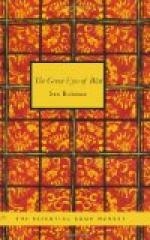“A nurse!”
“Yes. He assured me that he had heard and seen her! Mrs. Hawkins also was certain on the point. Neither of them were ever allowed in the house, by the way. But Damar Greefe paid them well—and they were satisfied. The identity of the ‘nurse’ is evident, I think?”
“Perfectly evident. But how was poor Lady Coverly disposed of—and why this elaborate secrecy?”
“Well,” replied Gatton slowly—“out of the multitude of notes which I have compiled upon the case, I have worked out a sort of summary, and it amounts to this: The whole series of outrages turns upon something in the financial arrangements of the late Sir Burnham of benefit to the Eurasian doctor. It may be that Damar Greefe had some secret locked up in the Bell House which he could not very well remove, and that the greatest peril he feared was the taking over of the Park property by an heir. I assume he had complete authority over the late Lady Burnham; and his object in concealing her death (for our investigations at Friar’s Park have definitely established the fact that no one had resided there for twelve months at least) was clearly this: he hoped to carry on the pretense of attending upon the invalid until—”
“Until there was no heir to the property remaining alive!” I interrupted excitedly. “Exactly, Gatton! That is my own theory, too!
“We have now received,” continued the Inspector, “some particulars concerning the circumstances of Roger Coverly’s death in Basle. Whilst there was no direct evidence of foul play (and at that time at any rate no reason to suspect it) I am convinced that the local physician who attended him at the hotel and the specialist who was sent for post-haste from Zurich were by no means agreed as to the cause of death.
“The symptoms were apparently not unlike those which would be caused by a snake-bite, for instance; but naturally one does not look for poisonous snakes in Switzerland. There was some sort of inflammation of the skin apparently”—he consulted a page of his note-book—“which might have been eczema or something similar, of course, but which according to medical evidence had no apparent connection with the cause of his death. This was given in the certificate simply as syncope—although there did not appear to be any hereditary cardiac trouble or anything of the kind to account for a young fellow of that age dying suddenly of heart failure. And there had been nothing in his life during his sojourn at Basle which would help to clear up the mystery.
“However, no doubt seems to have arisen at the time, as you can well understand; nevertheless, I, personally, count the death of Roger Coverly as the first of the outrages to be laid to the credit of Dr. Damar Greefe!”
“The object of the whole thing is still completely dark to me,” I declared.
“In a sense it is dark to me,” replied Gatton; “but considering that the boy died at a time when the health of his father, Sir Burnham, was already giving cause for anxiety, I maintain that he was removed because his inheritance of Friar’s Park was feared—by some one. The invitation from Dr. Damar Greefe to Sir Marcus is a very significant piece of evidence, of course; and when we consider that it reached Sir Marcus within a very short time of his return from Russia, the conclusion is obvious.




